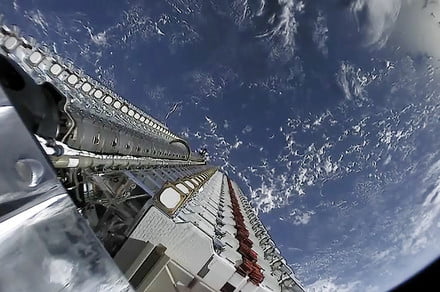When SpaceX properly launched its Starlink program in May 2019, many observers lauded the company’s ambitious plan to provide broadband coverage to locations around the world using thousands of small satellites. And then the astronomers piped up.
Having watched videos of the first batch of 60 satellites sailing through the night sky, stargazers voiced concerns that the the brightness of the satellite — if deployed in large numbers — could affect their ability to get a clear view of deep space, and also interfere with radio wavelengths used during the course of their space exploration.
Having listened to astronomers’ fears, SpaceX is now looking for a solution. Speaking to reporters at SpaceX’s headquarters in Hawthorne, California on Friday, Gwynne Shotwell, the company’s president and chief operating officer, revealed that one of the 60 satellites slated for deployment before the end of this year will have a special coating on it designed to make it less reflective when sun rays hit it. If it works, future Starlink satellites could all receive the same coating.
“We’ll do trial and error to figure out the best way to get this done,” Shotwell said in comments reported by SpaceNews, adding that it has to be sure the coating doesn’t adversely affect the satellite’s performance.
Astronomers must do their work
The SpaceX executive said that while it may be exciting to spot a Starlink satellite in the night sky, it was also important for astronomers to be able to do their work without interruption. She also noted the importance of keeping the skies clear for the younger generation in order to encourage a long-term interest in space.
Speaking frankly, Shotwell admitted that the issue regarding the brightness of the satellites had been a surprise for everyone, saying, “No one thought of this. We didn’t think of it. The astronomy community didn’t think of it.”
SpaceX is aiming to launch batches of 60 satellites every two to three weeks over the next 12 months, a rate that should give them enough coverage to provide global broadband by the middle of 2020. So far the company has launched two batches — one in May 2019 and the other in November 2019.
In competition with SpaceX, other companies such as Facebook, Amazon, and SoftBank-backed OneWeb are also interested in using satellites to build broadband services, and so astronomers are understandably keen to find an early solution that can be adopted by all of those involved.

